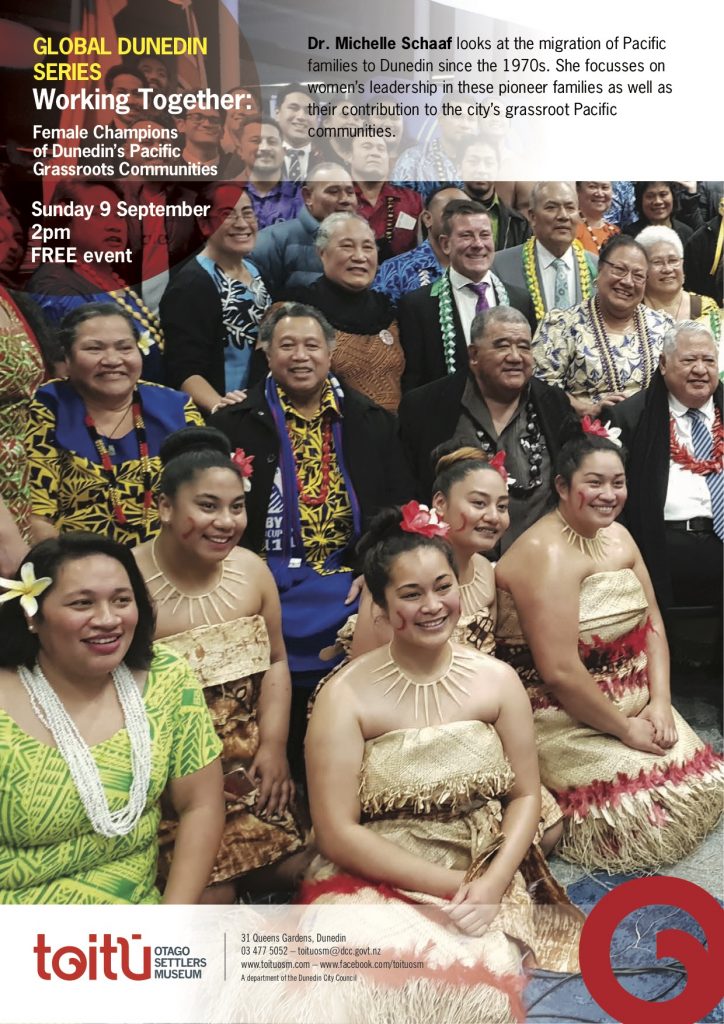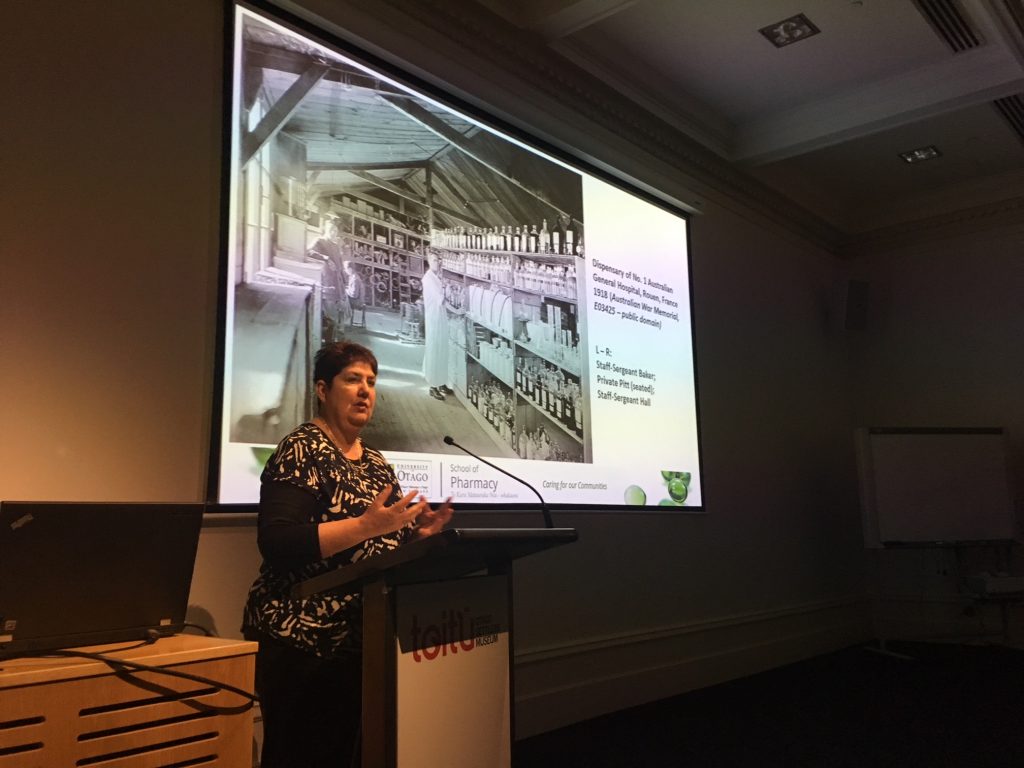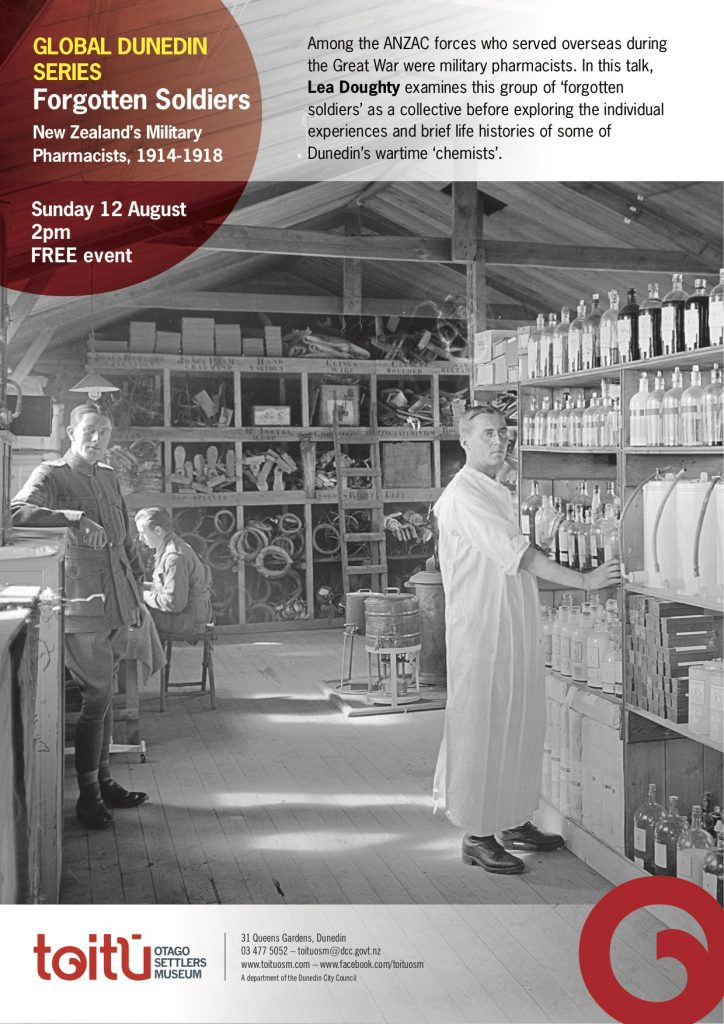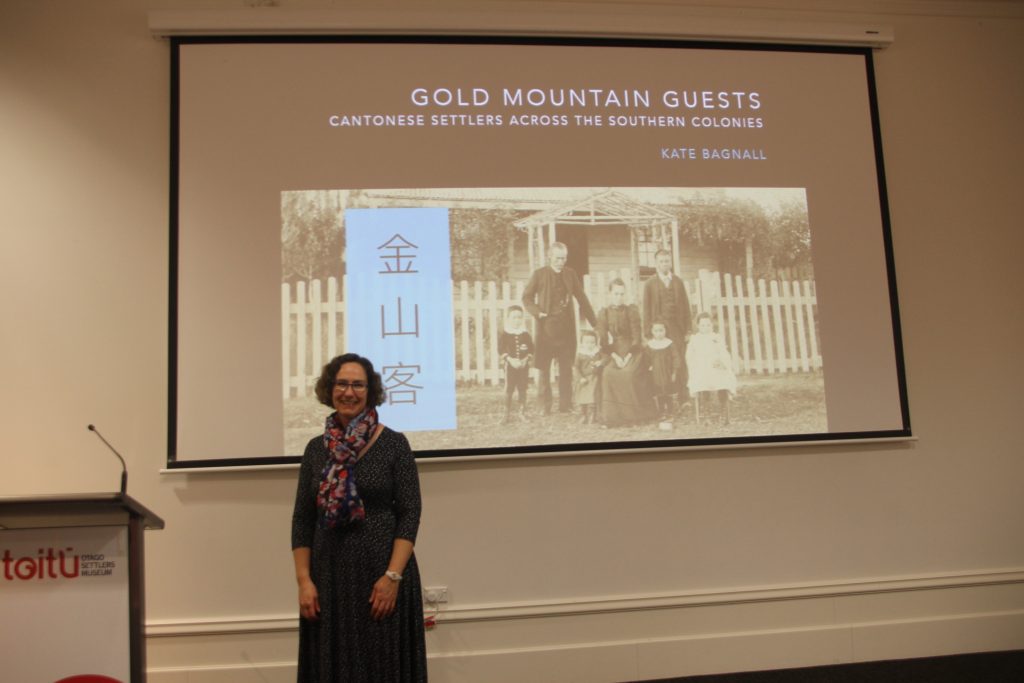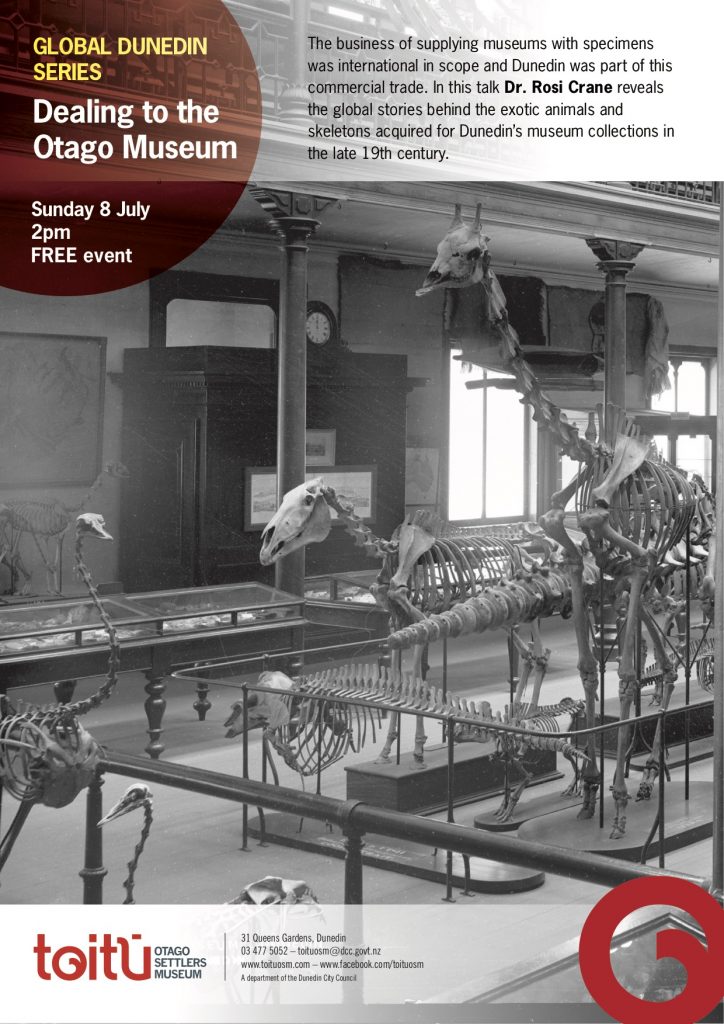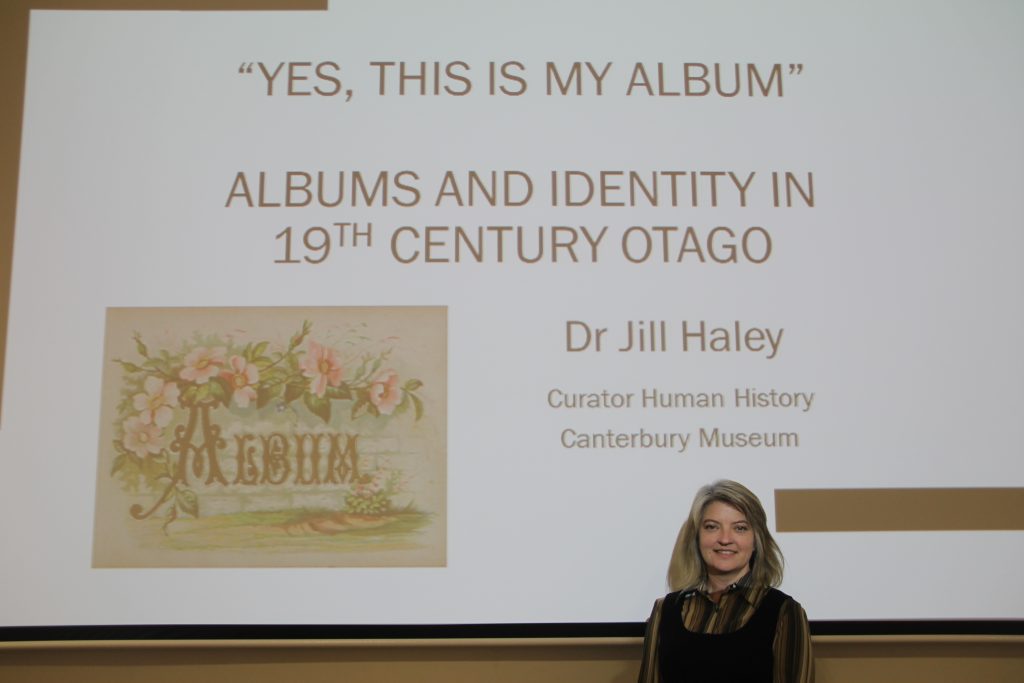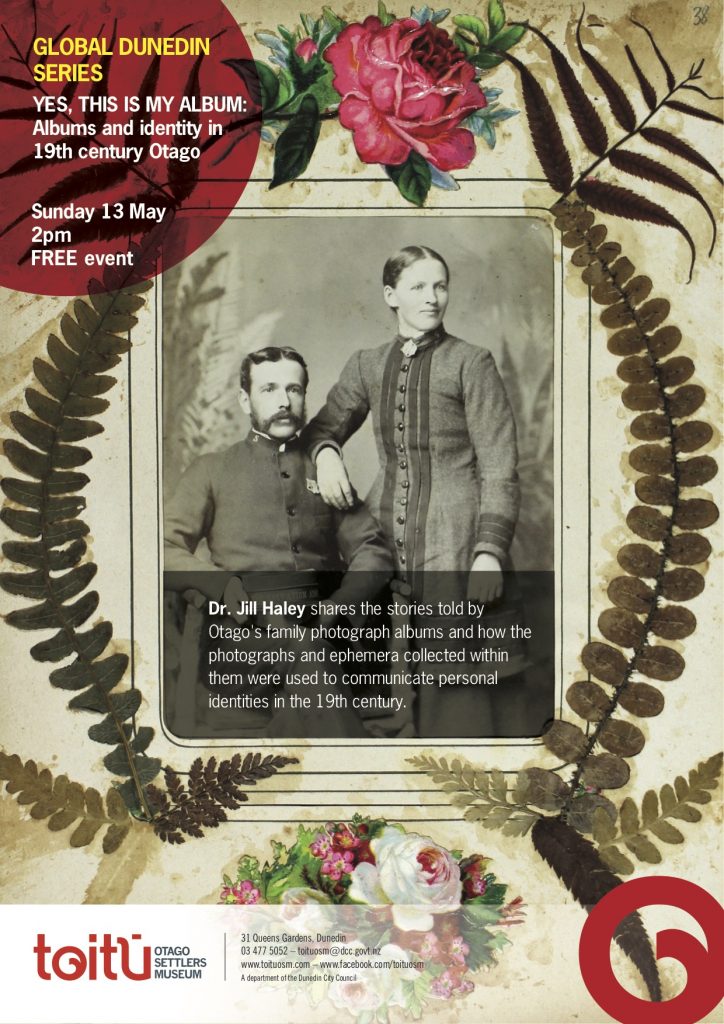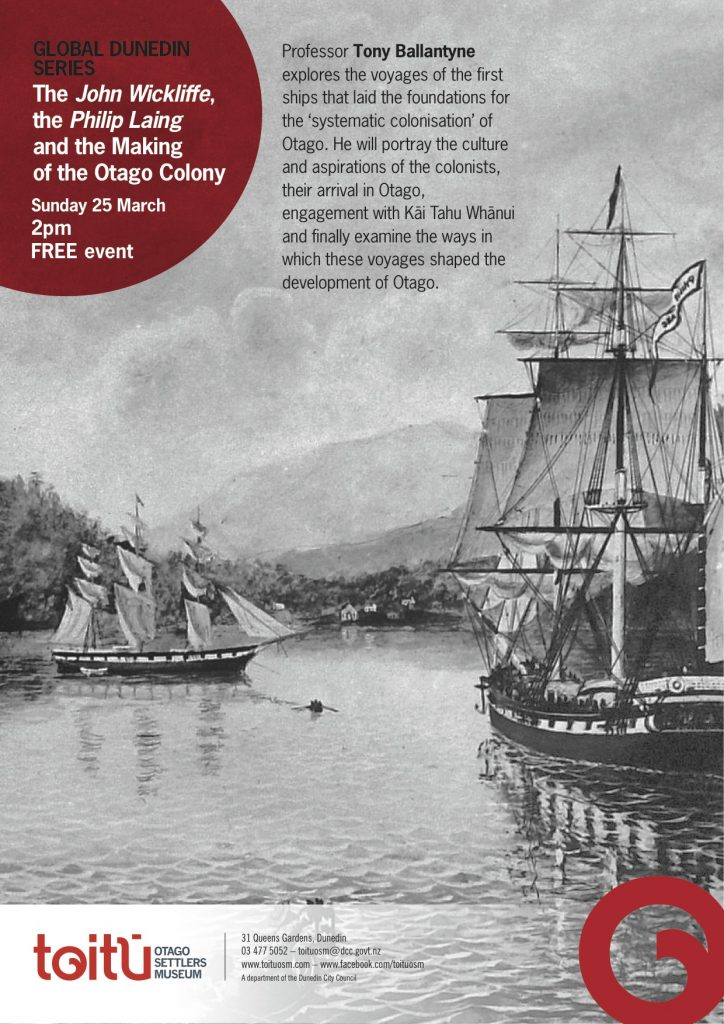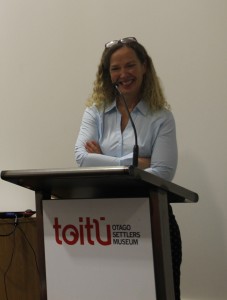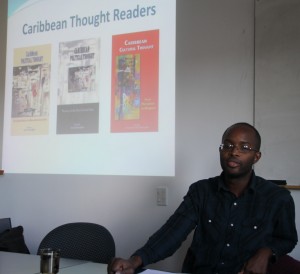Global Dunedin Lecture on Pacific Women’s Leadership
Our next Global Dunedin lecture will be presented by Dr. Michelle Schaaf (Te Tumu: School of Māori, Pacific and Indigenous Studies) on Sunday 9 September. She will discuss the migration of Pacific families to Dunedin, focusing in particular on the role of female leadership within these pioneer families, especially their contribution to the city’s Pacific communities. Join us at 2pm on Sunday at Toitū’s Auditorium for this free event.
Dunedin’s Wartime Chemists
In her Global Dunedin Lecture at Toitū on 12 August, Lea Doughty (PhD Candidate, School of Pharmacy) used a life history approach to track the wartime experiences of pharmacists who served with New Zealand forces during World War I. Lea’s research is on military medicine during the Great War, focusing on pharmacy and the ANZAC forces. Her Global Dunedin lecture touched on the reasons why pharmacy and pharmacists are often a forgotten aspect of New Zealand’s histories of World War I, largely because their work takes place at a distance from the main event, or they were diverted into other military roles. In total, 192 men who had worked as pharmacists served with New Zealand forces, 18 of whom were born in Dunedin. Of the 192 men, 27 died on active service. These included William Sloan, the first pharmacist to enlist, who died of wounds he sustained at Gallipoli, and Harold Dodds of Port Chalmers who died at Passchendaele in October 1917. Looking wider than the Dunedin cohort, Lea highlighted the range of roles pharmacists were given. William Brosnahan, from the West Coast, was utilised as a vet in the Imperial Camel Corps. Interestingly, there was one Māori chemist who served with the New Zealand forces. Jack Hiroti attained the rank of Sergeant in World War I, and went on to serve with distinction in World War II with the 28th Māori Battalion. Many thanks to Lea for providing an interesting insight into a little known aspect of New Zealand’s military history, and for bringing to light the personal histories of these servicemen.
Tracing Dunedin’s wartime ‘chemists’
Our next Global Dunedin Lecture will be presented by Lea Doughty (PhD candidate, School of Pharmacy, University of Otago) on Sunday 12 August at Toitū (for details see poster). In this talk Lea will discuss the pharmacists who served in New Zealand forces during World War 1, trace some of their experiences during and after the war, and place this history into the context of the global history of military medicine. This is a free talk and all are welcome!
Global Dunedin Series
In June, the Centre was delighted to host one of our favourite historians, Dr. Kate Bagnall, who was visiting Dunedin to conduct research at local archives for her current project tracing Chinese naturalisation across the British colonies. Kate also kindly presented on an aspect of this research in our Global Dunedin speaker series. In her talk she traced the legal and personal histories of naturalisation, connecting the Dunedin experience into a larger Australasian setting, arguing that tracing naturalisation processes and records helps to uncover different histories of migration and mobility from the standard narrative of single male sojourners. This is particularly important research because Chinese presence in the British colonies is often told through a focus on exclusion and immigration restriction. Incredibly, Kate also presented fresh research barely hours old from her visit to the Dunedin archives, revealing that there were 450 Chinese who naturalised in New Zealand prior to 1908, with 197 of those in Otago. The first in Otago was Louis Gay Tan in 1870. We thank Kate for a wonderful lecture and wish her all the best for the research project.
Our next Global Dunedin lecture will be given by Dr. Rosi Crane on July 8 on the international trade in museum specimens during the nineteenth century. When the Otago University Museum opened in its new building on Great King Street in 1877, amongst other things there was a giraffe skeleton, a stuffed lion, several monkeys, and innumerable birds from Australia, Europe, India and New Zealand. From the outset the collections were international. Many of the exotic animals came to Dunedin from commercial dealers from London, Sydney, Bremen and Prague. Some of the purchase money came from limited museum funds but most came from trading moa bones. Kiwi and kakapo skins had their value too but they were not as valuable as moa. A few scraps of correspondence has survived which tells us the price that these animals fetched, what else the dealers had to offer and what the curators wanted to fill perceived gaps. The business of supplying museums with specimens was extensive and Dunedin was part of this global network of supply and demand. The story of how historical commercial trade practices have impacted on the Museum is told here for the first time.
Photography, Family Albums and the Making of Identity
In conjunction with Toitū Otago Settlers Museum, the Centre hosted the third lecture in the Global Dunedin Speaker Series on Sunday 13 May. Dr. Jill Haley, Curator Human History at Canterbury Museum, and a former archivist at Toitū, spoke to an attentive audience about album culture in colonial Otago and how engagement in this practice helped forge personal identity. In a richly illustrated talk, Jill discussed some the findings from her recent doctorate titled The Colonial Family Album: photography and identity in Otago, 1848-1890 (which can be downloaded from the University of Otago’s library here), which examined over 50 albums from Toitū’s collection. Although it might be assumed that albums were used by migrants to remember family and to assert familial connections to their former homes (whether Scotland, England or Ireland), instead the majority of album makers collected and displayed photographs that asserted their connections to their new home in the Otago colony. But album makers also included photographs that illuminated the global dimensions of their personal connections, including Priscilla Scott’s, which included images relating to places she visited with family, notably Peru, Hawaii and the United States. Increasingly, album makers also purchased photographs of local and international celebrities, as well as the the British Royal Family, for their collection.
Many thanks to Jill for a fantastic and illuminating talk that provided an insight into how the global practices of photography and album culture were shaped by local conditions and utilised to narrate personal identity.
Photography and Global Dunedin
The Centre’s monthly Global Dunedin Lecture Series resumes on Sunday 13 May with a talk by Dr. Jill Haley (Canterbury Museum), who will discuss the role of colonial photography and album-making in shaping the identities of Otago’s 19th century settlers. Jill’s talk will take place at Toitū’s Auditorium, starting at 2pm. All welcome!
Global Dunedin Speaker Series 2018
This year the Centre is excited to be collaborating with Toitū on a Global Dunedin Speaker Series. It runs on a monthly basis, on a Sunday afternoon, and all talks take place at the museum Auditorium. This years series will feature local, national and international speakers, including Charlotte Macdonald (Victoria University of Wellington), Jill Haley (Canterbury Museum), Kate Bagnall (University of Wollongong), Rosi Crane (Otago Museum), Lea Doughty (Otago) and Ben Schrader (Wellington). We’ll be posting regular updates about this series throughout the year.
Tony Ballantyne will kick off the series on March 25th (see poster). We hope to see you there.
Lecture on the August Offensive
The next Global Dunedin lecture will take place this Sunday, August 9th, in the Toitu Auditorium, beginning at 2pm. It is being delivered by Seán Brosnahan, a well-known local historian and curator, who will discuss the fighting at Gallipoli that came to a thundering crescendo in the August Offensive. Its failure, despite the heroic roles played by the Otago Infantry and the Otago Mounted Rifles, was the death knell of the Dardanelles campaign. Come along to hear an excellent public speaker mark the 100th anniversary of that ill-fated offensive.
Finding India in Dunedin
Dr Jane McCabe will give a talk today on Dunedin’s Indian connections, specifically Kalimpong, where Dr. Graham operated an orphanage for Anglo-Indian children. Some of these children were sent to Dunedin in the early decades of the twentieth century. In the afternoon’s talk Jane will discuss the pathways and fate of these children once in New Zealand. Everyone is welcome to attend this free public event, which begins at 2pm in Toitu’s Auditorium.
Dunedin’s Genetic Inheritance and Caribbean Cultural Thought.
The Centre has recently hosted two riveting research-based talks.
The first, on Sunday 10 May, was part of the Centre’s ongoing project, Global Dunedin. Professor Lisa Matisoo-Smith, a biological anthropologist from Genetics Otago gave a public lecture at Toitū: Otago Settlers Museum, “Who do you think you are – Dunedin?”
Lisa discussed the genetic ancestry of Dunedin’s population based on the testing of randomly selected DNA samples. This research is part of the “Africa to Aotearoa” project, in which Lisa looks at the deep ancestry of New Zealanders, which in turn is part of a wider international study, the Genographic project, funded in part by National Geographic. While one might suspect that Dunedin’s genetic make-up is essentially homogenous from its Scottish heritage, the research shows just how diverse Dunedin’s population is, in line with other major cities in New Zealand.
On Thursday, May 15 visiting scholar Dr Aaron Kamugisha gave a CRoCC seminar, “The Caribbean’s Intellectual History through Culture”. Aaron discussed the global impact of Caribbean theorist’s, particularly CLR James, amongst others, on the development and dissemination of anti-colonial thought and intellectual traditions. He placed these theorists in the context of the development of two threads of intellectual history: Caribbean Studies and Caribbean Cultural Studies, but argued that these thinkers ought to be understood in term of Caribbean radical thought.

